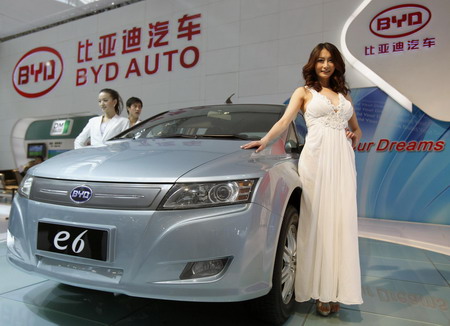Economy
Carmakers see slower but robust China growth
(Agencies)
Updated: 2009-11-24 10:27
|
 Models pose next to a Chinese BYD E6 car at the Guangzhou Autoshow November 23, 2009. [Agencies] |
Locals Flex Their Muscles
Beijing has made no formal decision on whether to extend the stimulus measures beyond the official cut-off date of December 31.
But many executives have said consumers are generally expecting the incentives to remain in place beyond December, potentially fanning more sales.
The 45 percent surge in China's car sales so far in 2009 has also left other emerging markets such as India and Brazil behind, while Russia has sunk into oblivion as the global financial crisis slashed car sales there in half.
Geely Automobile Holdings, whose parent has been named by Ford Motor as the preferred bidder for the Volvo cars unit, said it expects its sales to grow 20-30 percent next year -- even without government stimulus -- exceeding expected growth for the overall market.
Geely currently has just 2.2 percent of China's passenger car market, lagging Chery Automobile Co, the top-selling Chinese brand, which has 4.1 percent.
Foreign auto makers will also face increased competition from their own partners as they seek sales growth under their own brands with know-how gleaned from partners over the years.
SAIC Motor Corp, China's biggest carmaker and GM's main partner, said it expects to double its sales of own-brand vehicles in 2010 to 180,000 units.
Sales this year would themselves be nearly double an original target thanks to the successful launch of the mid-range sedan line, Roewe, developed with technology acquired from defunct British carmaker MG Rover.
"We do not dare say that we are very successful with our own-brand cars," SAIC Motor President Chen Hong said.
"This is a difficult path and there is lots of work to do."












